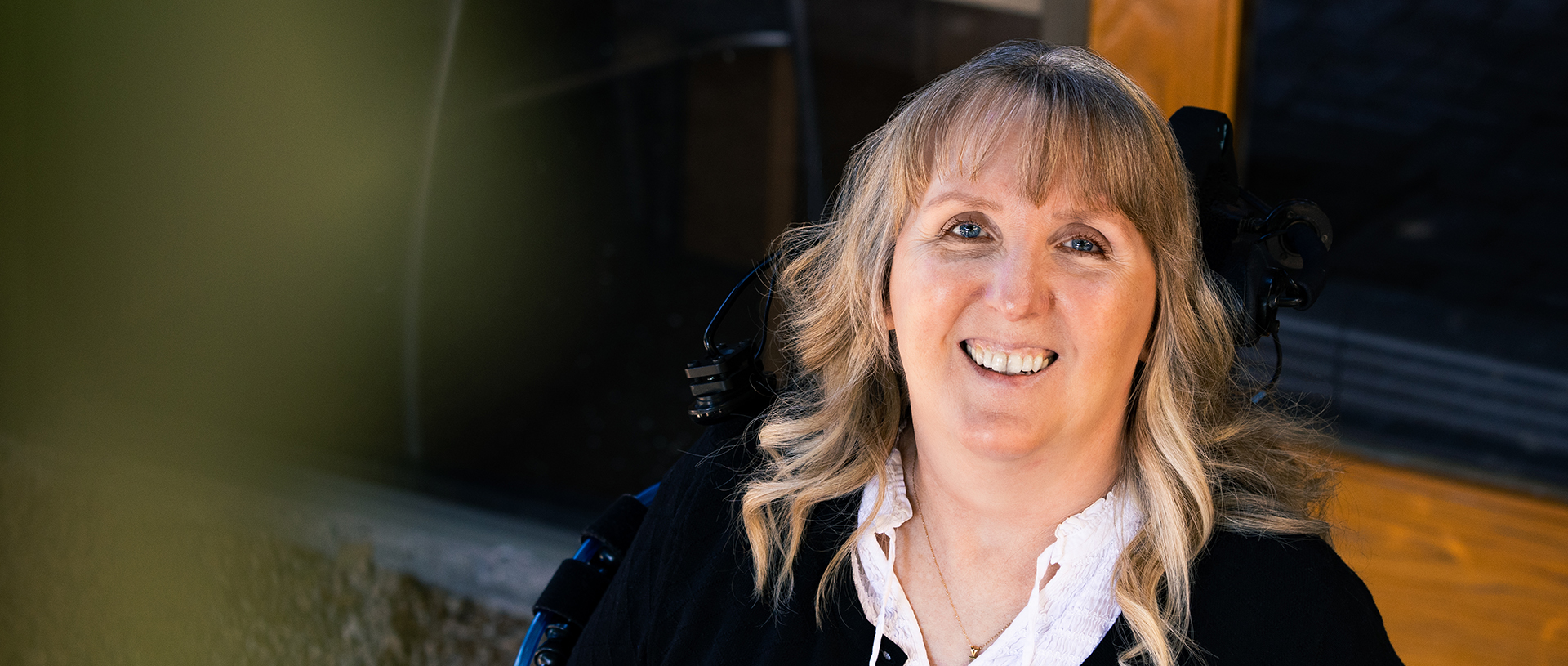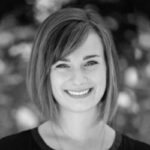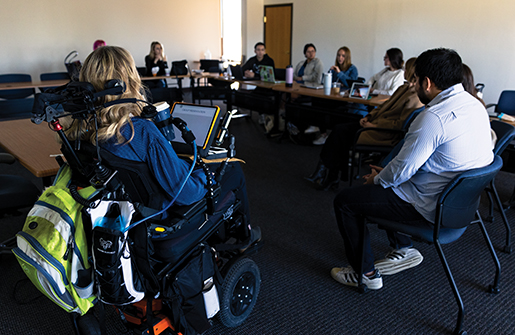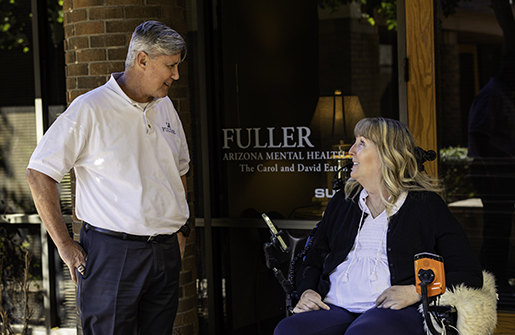
It was an ordinary parenting decision that moved the needle in Rachel Lingle’s (MSMFT ’17) faith journey—and in her vocational calling. “I was in my late 20s looking for a preschool for my kids, and the school within the Nazarene church just happened to align better with my kids’ nap schedule,” Rachel shares as she laughs, recalling the pragmatic decision that led to such formative life change. “I think God uses practical stuff like that,” she says, “and that’s really where my faith began to grow, when I began building relationships with other moms.”
At the time, Rachel had just left her job as an accountant. Earlier in her 20s, she began to have unusual physical symptoms in her day-to-day life, which led to a diagnosis of a chronic disorder that affects her mobility. Rachel’s declining physical ability changed the trajectory of her vocation, as she could no longer manipulate the papers that she handled daily as a part of her work. Home with three young children, she was starved for adult interaction. “I was untethered; I had nothing but my kids and my husband that was steady in my life.”
The moms at the preschool became Rachel’s safe haven. A group of ten mothers formed, and after dropoff, they’d grab coffee or lunch together. Rachel immediately noticed something different about these parents whose faith guided their lives. She noticed that she would be reactive or easily blown off course by small things that happened with her children, but the other moms were able to remain more patient, calm, and peaceful when challenges arose. Rachel realized that her task-oriented lifestyle—in contrast to the relational lifestyle modeled by some of the other moms—came at the cost of personal connection in her life. While it may have served her well in her previous career, it was no longer meeting her needs as a mother who was navigating the world with declining physical ability.
Until then, the extent of Rachel’s experience with church was attending the required services at her Catholic school as a child. “Faith really was not a part of my upbringing,” Rachel shares. “My dad was not very embracing of faith or people who expressed their faith. He would make fun of people who were strong in their faith.” So when one of the moms from preschool invited Rachel to a charismatic church for Sunday service, she was a little suspicious at first. “I had never really been in a church like that before. In my experience of church, you speak when you’re spoken to. You stand or sit or assume a posture when you’re told to. Here, people were raising their hands, swaying, and singing.”

Meggie Anderson (MDiv ’16) is a writer and nonprofit manager living in
Seattle, Washington.

Lindsey Sheets is a video editor, colorist, and social content creator for
FULLER studio.
It was an ordinary parenting decision that moved the needle in Rachel Lingle’s (MSMFT ’17) faith journey—and in her vocational calling. “I was in my late 20s looking for a preschool for my kids, and the school within the Nazarene church just happened to align better with my kids’ nap schedule,” Rachel shares as she laughs, recalling the pragmatic decision that led to such formative life change. “I think God uses practical stuff like that,” she says, “and that’s really where my faith began to grow, when I began building relationships with other moms.”
At the time, Rachel had just left her job as an accountant. Earlier in her 20s, she began to have unusual physical symptoms in her day-to-day life, which led to a diagnosis of a chronic disorder that affects her mobility. Rachel’s declining physical ability changed the trajectory of her vocation, as she could no longer manipulate the papers that she handled daily as a part of her work. Home with three young children, she was starved for adult interaction. “I was untethered; I had nothing but my kids and my husband that was steady in my life.”
The moms at the preschool became Rachel’s safe haven. A group of ten mothers formed, and after dropoff, they’d grab coffee or lunch together. Rachel immediately noticed something different about these parents whose faith guided their lives. She noticed that she would be reactive or easily blown off course by small things that happened with her children, but the other moms were able to remain more patient, calm, and peaceful when challenges arose. Rachel realized that her task-oriented lifestyle—in contrast to the relational lifestyle modeled by some of the other moms—came at the cost of personal connection in her life. While it may have served her well in her previous career, it was no longer meeting her needs as a mother who was navigating the world with declining physical ability.
Until then, the extent of Rachel’s experience with church was attending the required services at her Catholic school as a child. “Faith really was not a part of my upbringing,” Rachel shares. “My dad was not very embracing of faith or people who expressed their faith. He would make fun of people who were strong in their faith.” So when one of the moms from preschool invited Rachel to a charismatic church for Sunday service, she was a little suspicious at first. “I had never really been in a church like that before. In my experience of church, you speak when you’re spoken to. You stand or sit or assume a posture when you’re told to. Here, people were raising their hands, swaying, and singing.”
Meggie Anderson (MDiv ’16) is a writer and nonprofit manager living in
Seattle, Washington.
Lindsey Sheets is a video editor, colorist, and social content creator for
FULLER studio.


It was uncomfortable, even for Rachel, who felt she’d been inoculated against such unease in new situations thanks to growing up as a military kid moving around different states and counties. “It was normal for me to be around people from a variety of cultures. Even in the military, there are people who come from different US territories and cultural backgrounds.” Showing up that Sunday was more foreign to Rachel than sitting with someone from a different nationality or ethnic background. But because of the groundwork that had been laid through relationships with her new friends and the movement of the Holy Spirit, Rachel accepted Christ into her heart.
Rachel’s relationships with the moms from the preschool remained steadfast. They gathered monthly at Rachel’s home because it was harder for Rachel to leave the house with her disability. She looks back at that decade of her life as a faith-building season, preparing her to do the work that she is doing now. It was in the vulnerable moments of sharing with other moms that Rachel learned how to slow down, focus on emotions, and hold space for someone so that they can feel heard.
The slowing down that Rachel learned in the context of relationships mirrored the physical slowing down that she experienced when her mobility began to really change. “I am not nearly as fast as I used to be at anything. I need to be much more deliberate than I was. I need to be much more structured now; I used to fly by the seat of my pants.” Rachel says one of the biggest outcomes of her disability journey was taking time to be in the moment. “Being able to slow down and empathize and feel with people—I don’t think that I would be able to sit with people as a therapist and hear difficult stories and stay with them, be open to just holding that space for them to experience hard things, if I hadn’t been through all of that.”
It was a blessing for Rachel to be amidst a community of believers as she received her diagnosis and began to experience its impact on her daily life. “Any kind of a huge life change like that . . . people tend to question everything. Your faith either really grows or it completely hardens your heart.” Rachel experienced an interesting inversion: as her physical ability declined, her faith began to grow. She was surrounded by people who believed that God had a plan for her—and she believed it, too.


When her oldest child was close to graduating high school, Rachel began asking questions about what was next for herself. “God connected me to a person who went to my church, Wendy Lehnertz, who was teaching at Fuller at the time. She encouraged me to look into the Marriage and Family Therapy program.” As Wendy watched Rachel facilitate a Bible study at church, she saw something in Rachel that would be a gift to others in a therapeutic space. Any time they would get together, Wendy nudged her to look into graduate school. But at the time, therapy was an unfamiliar concept to Rachel. She had never sought out help like that herself.
Rachel applied to Fuller, was accepted, and graduated from the Marriage and Family Therapy (MFT) program at the Arizona campus in 2017. Since then, she has been practicing as a licensed therapist with a focus on couples and individuals working through relationship issues. “I don’t have all the answers. That’s not my role,” Rachel says. “But I think my role does include holding space for people to contemplate what the answers are, to be open to hearing the ‘still small voice’ within them. Sometimes in the busyness of the day-to-day, it’s hard to do that. But when you’re sitting in a room with one other person and no other distractions, you are able to do that better.” It’s the ideal environment for Rachel to live into her vocation: she gets to create space for her clients to feel heard and accepted, and she offers help and encouragement—even challenging her clients at times.
Rachel did not always see herself ending up here—a licensed therapist with a seminary degree—but, she says, “When I look back over all of the experiences of my life, I can really see how they have pointed me to where I am now.” Without living in different cultures as a military kid, she would not be as aware of and able to connect with the variety of people who come into her office today. The emotional space that Rachel learned how to hold for other women from her mothers’ group equipped her to intuitively hold space for her clients. “And,” Rachel says, “the disability journey that I have been on has pointed me to being empathetic and gentle and accepting of people.”
Now, Rachel has returned to Fuller, enrolling in the Doctor of Marriage and Family Therapy (DMFT) program. She is also stepping into a new role as the director of the mental health clinic soon opening at the Fuller Arizona campus, where she will see clients and supervise current MFT students as they gain the practical experience needed to finish their programs. Rachel’s lived experience will now impact the campus at an institutional level.
“You can’t take clients where you haven’t been” was one of the most important lessons in the classroom for Rachel when she was an MFT student. “You can only take them to the level that you’ve reached. How you are in your personhood as a therapist is really important and something you need to continue to take stock of to ensure growth.” In any kind of suffering—which is what usually brings someone to therapy—Rachel says she finds something she can relate to. “Whether it’s a client with chronic pain or a relational issue, there is something in my personal experience that I can draw empathy from.” As she begins her new role, Rachel is grateful to be able to share the gifts she’s gained from her journey: empathy, seeing commonality across differences, and slowing down and remaining present.
After moving to LA to work in television, Eric VanValin’s (MSMFT student) curiosity about the foster system sets him on an unexpected path to fatherhood, advocacy, and a new career.